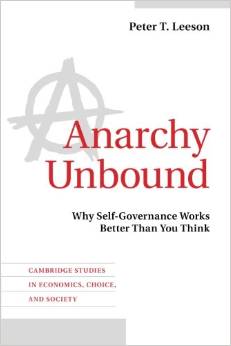The Possibility of Anarchy
By Arnold Kling

Large societies are held together by the soft glue of social norms and by the hard nails of government law enforcement. In Anarchy Unbound, Peter Leeson argues that we tend to underestimate the holding power of social norms and to overestimate the benefits of government.1 The book collects a number of essays published by Leeson over the past decade.
Leeson examines a number of situations in which individual selfishness could have adverse outcomes. His point is that although government is one solution for the problems in these situations, there are other solutions available as well.
“Countries with ineffective cultures will not find cooperation easy even with a powerful government.”
For example, he considers long-distance trade involving a middleman. If the middleman can earn more by plunder than by trade, then the middleman’s incentive is to engage in plunder. This in turn undermines any incentive on the part of producers to produce more than they can consume themselves. Thus, the possibility of banditry or plunder leads to a low-output, no-trade equilibrium.
One way to achieve a more positive outcome is with government. If government enforces laws that keep middlemen honest, then trade can take place. However, one alternative that Leeson notes is the institution of credit. If the producer agrees to supply goods to the middleman on credit, then the middleman has nothing to steal until he has already lent goods to the producer. Because the incentive to steal has disappeared, the disincentive to produce has disappeared, also. The institution of trade based on credit leads to the high-output trading equilibrium, in that sense serving the same function as government.
This suggests that the benefits of social norms and/or government will be largest in societies in which trade among strangers is most valuable. Societies with dense but diverse populations or territories with low-cost transportation available would seem to be most likely to value trade, and thus relatively more likely to develop strong government.
Leeson suggests that we do not observe large, complex societies without government because cases where the cost of government is high (including the cost of government predation as well as administrative costs)
… are also the cases in which government is being extended over a massive population, which means that the potential increase in gains from trading are also massive. It’s therefore harder for the cost of government to be larger than the difference between social wealth in the lower- versus higher-trade equilibrium. (Leeson, page 165)
The role of government in giving strangers the confidence to trade has been explored elsewhere in the economics literature. For example, Ronald Findlay and Kevin H. O’Rourke have argued that trade has tended to flourish under hegemonic empires.2 However, Leeson points out that the arena of international trade is technically one of anarchy, in that there is no world government acting with police powers, because
… the organizational and enforcement costs of a global government extending over 6.5 billion people are prohibitively expensive. (page 166)
For more on these topics, see “Michael Huemer’s Challenge to the Legitimacy of Government,” by Arnold Kling at the Library of Economics and Liberty, Jan. 23, 2013. See also
Why Peaceful Anarchy Fails, by Arnold Kling, EconLog, 2005.
Instead, various institutions of self-governance help to maintain order and make trade profitable across national boundaries.
Modern-day international trade is based largely on the set of private institutions that governed such exchange when it first emerged on a significant scale in medieval Europe…
The medieval law merchant, recall, was a polycentric system of customary law… private courts adjudicated disagreements between medieval traders…
Contemporary international traders continue to make wide use of private courts as a means of settling disputes in the form of international commercial arbitration. Today at least 90 percent of all international trade contracts contain arbitration clauses (page 167)
Leeson criticizes those who would “compare high-quality government with low-quality anarchy.” (page 197) He cautions that high-quality government is probably not a feasible option in a country like Somalia. There, he argues, anarchy actually has outperformed government in practice, based on a number of indicators of population well-being and economic progress.
He summarizes the relationship between the likely quality of government and the likely quality of institutions that substitute for government as follows:
… in general it seems that a given array of constraints on a country’s governance opportunity set will present governance options—anarchies or governments—of roughly the same quality. The governance opportunity set a particular country confronts will tend to consist of high-quality governments and high-quality anarchies, or low-quality governments and low-quality anarchies… Because of its far less constrained governance opportunity set, the United States, for instance, has among its governance alternatives both high-quality government and, I suspect, high-quality anarchy.
What I took away from this is that some societies are better than others at solving problems of governance, either using private mechanisms or by designing and operating the institutions of government. In other words, cultural capital may be the most important factor determining the ability of a society to achieve the benefits of cooperation and the gains from trade. Countries with effective cultures may be able to cooperate even if government were weak or even non-existent. Countries with ineffective cultures will not find cooperation easy even with a powerful government. In the latter cases, a strong government is likely to do at least as much to contribute to predation as to prevent it.
*Arnold Kling has a Ph.D. in economics from the Massachusetts Institute of Technology. He is the author of five books, including Crisis of Abundance: Rethinking How We Pay for Health Care; Invisible Wealth: The Hidden Story of How Markets Work; and Unchecked and Unbalanced: How the Discrepancy Between Knowledge and Power Caused the Financial Crisis and Threatens Democracy. He contributed to EconLog from January 2003 through August 2012.
For more articles by Arnold Kling, see the Archive.

